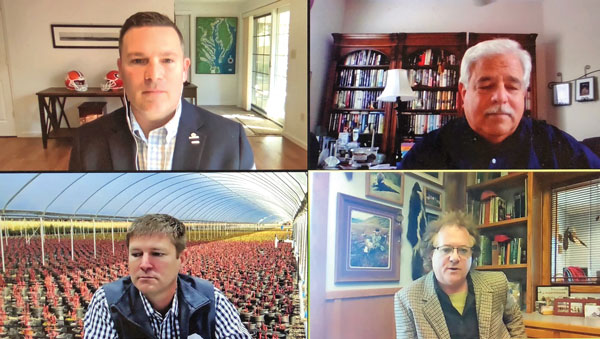5/1/2021
Growers' Thoughts on Advocacy
Jennifer Zurko
Save the Date!
The Impact Washington Summit will be held in Washington, D.C., on September 20-22 at the Hilton National Mall. Registration will officially begin in the coming weeks, so stay tuned!
ICYMI: Paycheck Protection Program Extended
President Biden signed the extension for the Paycheck Protection Program. The application deadline is now extended until May 31.
Sun Sets on Worker Visa Ban
On March 31, the Biden administration quietly let expire the Trump ban on most foreign worker visa admissions to the U.S. The ban had curtailed entry of most foreign workers with limited national-interest exceptions. For horticulture, H-2B and J-1 visa admissions are important.
Needed: More H-2B Visas
On April 8, U.S. Citizenship and Immigration Services held a public listening session on whether to release supplemental H-2B visas. Landscape employers and others made a strong and urgent case for the visas. According to AmericanHort, positive comments outpaced negative ones by about 3 to 1. As of press time, the public comment period was still open. More updates will be provided in the coming months.
Growers’ Thoughts on Advocacy
One last bit that I left out of my coverage last month of AmericanHort’s Congressional Kickoff was the grower panel on advocacy. Moderated by AmericanHort’s Tal Coley, the panelists were Michael Frantz (Frantz Wholesale Nursery in Hickman, California), Mike Gooder (Plantpeddler in Cresco, Iowa) and Ben Bolusky (CEO and Executive VP of the Florida Nursery, Growers & Landscape Association).
Now that I have the space, I wanted to give what I learned proper attention to the thoughts and comments from the panelists on the importance of being involved in government relations, and advocating for their business and the horticulture industry.
“We have more input than we think,” said Michael. “And the power of each individual is amazing. The time invested in getting to know local elected officials really pays dividends.”
 Pictured clockwise from top left: Tal Coley, Ben Bolusky, Mike Gooder and Michael Frantz.
Pictured clockwise from top left: Tal Coley, Ben Bolusky, Mike Gooder and Michael Frantz.
Mike has had several local and federal representatives for visits to Plantpeddler, including both senators, and he started to get involved at the local level after he attended one of AmericanHort’s legislative events.
“It changed my view of the value of advocacy,” said Mike.
Plantpeddler may be completely surrounded by Iowan ag farmland—corn, soybeans, cows and chickens—but “we represent dollars and votes,” he said. “We’re constituents.”
“Elected officials need to know the stories of their constituents,” said Ben, who, with FNGLA, is very active in local Florida government. “They need names and faces. Perception is reality. If you don’t like the reality, you have to try and change the perception.”
Mike and Michael gave their tips for inviting legislators to your business.
“Try to get them when you know they’re passing by—especially during election season,” said Mike. “Then follow up after their visit. Email them and mail thank-you notes.”
Mike also suggested inviting the local TV and newspaper media, too. And centering their visit around planned events provides some extra pomp and circumstance.
“You have to try and develop a relationship with them,” said Michael. “They won’t support legislation that directly affects you if they don’t know about you.”
And if you’ve done your research on your elected official ahead of time (which you definitely should!), then you’ll know where they stand on most of the issues that affect your business. But what if they don’t necessarily align with your needs? That’s when in-person visits are vital to really showing them to help understand your challenges.
“It has to come in baby steps,” said Mike. “Even if you think there’s an adversarial relationship, once you give them that exposure, many times they change their minds.”
“We all have a common interest in food and flowers,” said Michael. “Have an open mind—their interests are just as important as yours.”
For tips on what to do when meeting with your lawmakers, go to tinyurl.com/repvisittips.
—JZ
Farm Workforce Bill Clears House, Heads to Senate
H.R.1603, the AmericanHort-supported Farm Workforce Modernization Act, passed the House on March 18. Thirty Republicans joined all but one Democrat to vote to approve the bill. It now heads to the Senate, where a bipartisan team of Sen. Mike Crapo (R-ID) and Michael Bennet (D-CO) have pledged to introduce a companion bill and begin the negotiation process. The negotiating environment is complicated, though, by the evolving situation at the U.S./Mexico border.
Thanks to the hundreds of you who responded to calls for messages to Congress. Your support helped secure the strong House vote, setting us up more favorably for a Senate dialogue.
—Craig Regelbrugge, VP of Government Relations & Research, AmericanHort
A Reminder on Trucking Regulations
We received a report of a truck being pulled over in Maryland and cited with a safety violation for transporting greenhouse plants as agricultural commodities under the ag exemption.
Since the rules were just clarified in December to embrace nursery and floriculture, there could be more incidents like this in the near term. It often takes time for rule change guidance to make its way to employees on the enforcement front lines. You can protect yourself and your plant shipments by having your drivers or haulers carry a copy of the current regulations printed out and available for enforcement officials. You can find those regulations in the Federal Register at tinyurl.com/agcommodity.
—Source: AmericanHort’s Capitol Wire newsletter